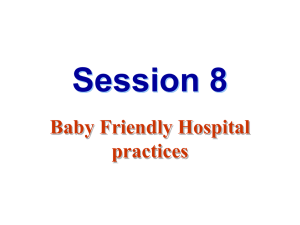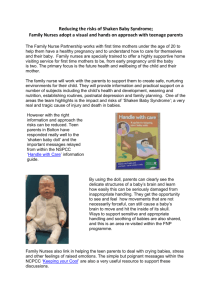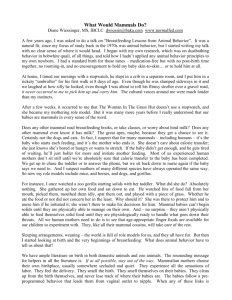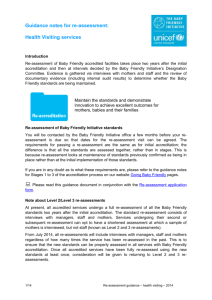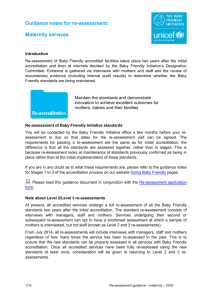DRAFT PLAN FOR ACHIEVING UNICEF UK Baby Friendly Initiative
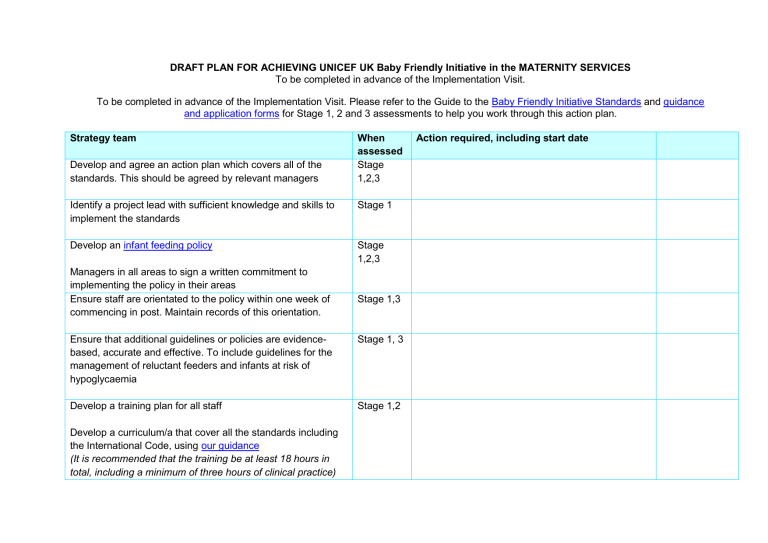
DRAFT PLAN FOR ACHIEVING UNICEF UK Baby Friendly Initiative in the MATERNITY SERVICES
To be completed in advance of the Implementation Visit.
To be completed in advance of the Implementation Visit. Please refer to the Guide to the Baby Friendly Initiative Standards and guidance and application forms for Stage 1, 2 and 3 assessments to help you work through this action plan.
Strategy team When Action required, including start date assessed
Stage
1,2,3
Develop and agree an action plan which covers all of the standards. This should be agreed by relevant managers
Identify a project lead with sufficient knowledge and skills to implement the standards
Develop an infant feeding policy
Managers in all areas to sign a written commitment to implementing the policy in their areas
Ensure staff are orientated to the policy within one week of commencing in post. Maintain records of this orientation.
Ensure that additional guidelines or policies are evidence- based, accurate and effective. To include guidelines for the management of reluctant feeders and infants at risk of hypoglycaemia
Develop a training plan for all staff
Develop a curriculum/a that cover all the standards including the International Code, using our guidance
(It is recommended that the training be at least 18 hours in total, including a minimum of three hours of clinical practice)
Stage 1
Stage
1,2,3
Stage 1,3
Stage 1, 3
Stage 1,2
Develop a system to ensure that all staff are scheduled to attend the training (within six months for new staff).
Follow up non-attendees.
Keep accurate records of staff attendance at, and completion of, training.
Orientate medical staff to the policy and provide training relevant to their role.
Consider information requirements of pregnant women
– feeding their baby and recognising and responding to their baby’s needs and developing a positive relationship with their baby in-utero.
Agree a plan to ensure that mothers are offered a conversation to meet their needs
Develop a prompt sheet and documentation to guide staff with how to engage women in a conversation
Develop outlines of parent education classes where these are provided
Develop a prompt sheet and documentation to support mother-centred postnatal information giving and care
Implement a breastfeeding assessment tool and written information for mothers about how to recognise effective feeding.
Stage 1,2
Stage 1,2
Stage 1,3
Stage 1,3
Stage 1,3
Stage 1,3
Agree timing of breastfeeding assessments
Agree commitment to implementing the International Code of
Marketing of Breastmilk Substitutes . Ensure mechanisms exist to monitor implementation
Ensure that any written information, including teaching materials and DVDs, provided for or displayed to new mothers should be accurate and effective and free from promotion of breastmilk substitutes, bottles, teats and dummies.
Identify sources of social and additional support with breastfeeding challenges and develop a mechanism to ensure mothers are made aware of these verbally and in writing
Develop a plan for auditing the standards including use of the appropriate audit tool
Ensure an efficient data collection system is in place
Consider how feedback from parents, including complaints will be listened to and acted upon
Stage
1,2,3
Stage 1,3
Stage 1,3
Stage 1
Stage
1,2,3
Stage 1,3
Consider how the facility can work collaboratively with other services to put the well-being of the baby and their mother/parents at the heart of care (for example NNU, paediatric wards, health visiting service)
If parents are referred to local voluntary organisations, develop mechanisms to collaborate formally, to include appropriate referral pathways
Antenatal and community staff
Stage 1,3
Stage 1
When assessed
Action required, including start date
Ensure that all pregnant women have the opportunity for a conversation about feeding their baby and recognising and responding to their baby’s needs and developing a positive relationship with their baby in-utero
If providing parent education classes, do so using locally agreed outline.
Undertake a full breastfeeding assessment with each mother on locally agreed day/s to include:
Recognition of effective feeding and milk transfer
Communicating their findings with mothers
Making a plan of care if indicated
Referral for additional support if required
Stage 1,3
Stage 1,3
Stage 1,3
Name
Delivery suite staff
Ensure that all mothers are:
given their baby to hold in skin-to-skin contact in an unhurried environment as soon as possible after delivery. Skin-to-skin contact to last for a minimum of one hour or until after the first breastfeed (whichever is sooner).
given support and encouragement to give the first feed in skin contact as soon as the baby is receptive.
Ensure that, should skin contact have to be delayed or interrupted because the health of either mother or baby demands, it should be started or resumed as soon as possible.
Ensure that mothers whose babies are transferred to
NNU/SCBU are taught to hand express their breastmilk early and frequently.
When assessed
Stage 3
Action required, including start date Name
Postnatal care staff
Ensure that all breastfeeding mothers are enabled to achieve effective breastfeeding according to their individual needs to include:
effective breastfeeding including support with positioning and attachment, hand expression,
responsive feeding, including feeding cues and breastfeeding as a means of comforting and calming babies. To include the potential impact of dummy use on responsive feeding
that they are encouraged to breastfeed exclusively and why this is important
should exclusive breastfeeding not be possible, that they are encouraged to maximise the amount of breastmilk received by the baby
given information verbally and in writing about recognising effective feeding before leaving hospital
given information before they leave hospital about the support available in the community, both social and additional support to deal with particular challenges
Staff caring for breastfeeding mothers and babies:
carry out a breastfeeding assessment as often as is needed within the first week on at least 2 occasions
ensure that breastfed babies are not given anything other than breastmilk except where there is a clear clinical indication that this is needed
When assessed
Stage 3
Stage 3
Action required, including start date Name
ensure that should infant formula be indicated, this is given as safely as possible.
Staff caring for mothers and babies who are being formula fed:
ensure that mothers are supported to learn how to make up a bottle of infant formula and to feed their baby safely (and responsively).
encourage mothers to hold their baby close and offer the majority of feeds themselves
All parents are supported to develop a close and loving relationship with their baby to include:
encouraging skin to skin contact
support to understand a newborn baby’s needs for closeness, sensitive verbal and visual communication, frequent touch, safe sleeping practice
information about relevant local parenting groups such as baby massage
Neonatal unit staff and postnatal staff
Stage 3
When assessed
Action required, including start date
Encourage mothers of babies in the Neonatal or Special Care
Baby Unit to express their breastmilk for their baby:
as soon as possible after the birth
by hand and by pump
at least 8 times in 24 hours, including at night.
Stage 3
Name


